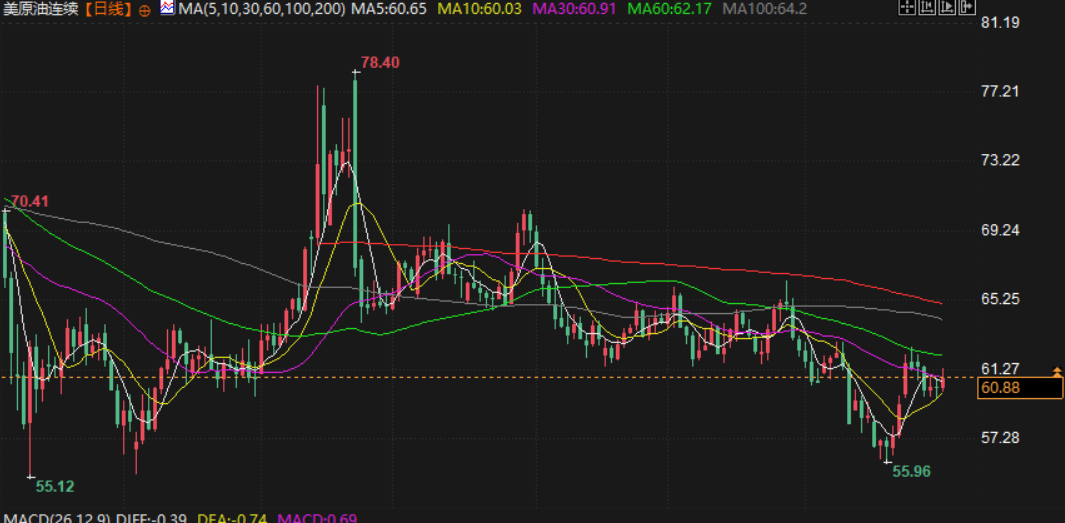Tensions in Venezuela boosted oil prices, with Brent crude nearing $65, awaiting the OPEC+ meeting.
2025-11-01 06:43:23

On Friday, media reports, citing sources, indicated that the United States might launch airstrikes against targets in Venezuela within the coming hours or days. This news immediately triggered market concerns about potential disruptions to Venezuelan oil supplies, causing oil prices to rise rapidly in a short period. However, President Trump subsequently clarified on social media that there were "no" plans for such strikes, easing market tensions and causing oil prices to fall back.
This dramatic volatility has reminded the market of a similar scenario earlier this year. Phil Flynn, senior analyst at Price Futures Group, asked, "Is this a Halloween prank or candy from Trump?" He noted that Trump had previously denied plans to attack Iran, but subsequently carried out airstrikes. Flynn warned that oil prices could surge on Monday if an attack actually occurs over the weekend.
Analysts are paying particular attention to the potential impact of the situation in Venezuela on the oil market. Flynn further stated, "This exacerbates geopolitical risks, and we could see this reflected in diesel crack spreads." He explained that even if the loss in Venezuelan heavy crude oil supply is not large, the impact will still be significant if the market perceives a complete disruption in exports.
It is worth noting that between September and October of this year, the U.S. military sank several speedboats allegedly transporting drugs off the coast of Venezuela, indicating a continued escalation of tensions in the region.
Besides geopolitical risks, several fundamental factors are jointly influencing the oil market. The US dollar is near a three-month high against major currencies, making dollar-denominated oil more expensive for holders of other currencies, thus dampening demand.
Meanwhile, continued production increases by OPEC and major non-OPEC oil-producing countries also put pressure on oil prices. Brent crude and U.S. crude fell 2.6% and 2% respectively in October.
ANZ Bank raised its 0-3 month crude oil price target to $70 per barrel this week, citing significantly increased supply risks due to US sanctions on Russian oil companies. The bank expects the OPEC+ alliance to approve a production increase of 137,000 barrels per day in December, but also believes any impact on Russian oil exports will be relatively short-lived, limiting further upside potential for oil prices.
A survey of 36 economists and analysts in October showed that market forecasts for oil prices in 2025 remained largely unchanged. The average price of Brent crude in 2025 is projected at $67.99 per barrel, about 38 cents higher than last month's estimate; the average price of U.S. crude in 2025 is projected at $64.83, slightly higher than the $64.39 projected in September. Year-to-date, Brent and U.S. crude have averaged $69.27 and $65.92 respectively.
"The delicate balance between supply growth, moderate demand, and geopolitical uncertainty is shaping oil prices in 2025," said Tobias Keller, an analyst at UniCredit Bank in Italy. He added that on the supply side, increasing production from OPEC+ and non-OPEC oil-producing countries is keeping the market well-supplied, while demand growth, though positive, is slowing, particularly in OECD economies.
Many analysts predict a supply surplus in the oil market by 2026, with estimates ranging from 190,000 to 3 million barrels per day. Concerns about this oversupply, coupled with economic worries related to US-China trade relations, caused oil prices to fall to a five-month low on October 20.
Since April, OPEC+ has raised its production target by more than 2.7 million barrels per day, representing about 2.5% of global supply, slightly less than half of the 5.85 million barrels per day production cut target previously agreed upon by the organization. Following a 137,000 barrel per day increase in November, the organization is inclined to make another small increase in oil production in December.
Geopolitically, the United States imposed sanctions on Russia’s two largest oil companies this month, while markets are also closely watching the fragile ceasefire in Gaza.
Analysts predict that global oil demand will grow by between 650,000 and 2 million barrels per day this year, primarily driven by economic growth in Asian countries. A report from the U.S. Energy Information Administration also shows that U.S. crude oil production reached a record 13.6 million barrels per day last week.
Meanwhile, Russia and the United States maintain ongoing dialogue on the Ukraine issue. A source in Moscow's diplomatic circles stated that Russia has maintained continuous contact with the US on the Ukraine mediation issue, and "the contact has never been interrupted." Furthermore, Hungarian Prime Minister Viktor Orbán has requested the US to exclude Hungary from sanctions on Russian oil, emphasizing that Hungary must fight to the end for the opportunity to purchase oil and gas from Russia, as there are no alternative sources.

- Risk Warning and Disclaimer
- The market involves risk, and trading may not be suitable for all investors. This article is for reference only and does not constitute personal investment advice, nor does it take into account certain users’ specific investment objectives, financial situation, or other needs. Any investment decisions made based on this information are at your own risk.





















